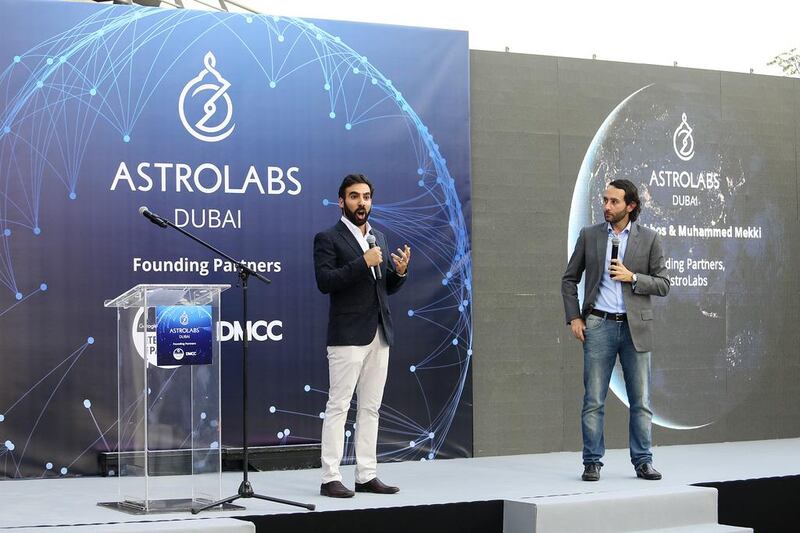AstroLabs – named after the astrolabe, an ancient navigational device perfected by the Arabs – is a new co-working space in Dubai.
While there have been a slew in recent years – Shelter, The Pavilion, Make, The Cribb – this latest venture, which officially opened late last month, boasts three hallmarks that set it apart.
Firstly, having been launched by two successful entrepreneurs (Muhammed Mekki and Louis Lebbos, who moved to Dubai in 2010 to work as consultants at McKinsey before launching the online shopping portal Namshi), Astrolabs offers both a training academy and mentoring with 30 entrepreneurs like themselves.
Then there’s the fact that, based in Jumeirah Lake Towers, AstroLabs offers a cut-price route to a full Dubai Multi Commodities Centre (DMCC) free zone licence, subsidising it in year one for a membership costing from Dh2,500.
Finally, there’s the Google link. AstroLabs is the first Google-partnered tech hub in the Mena region, meaning Dubai members have access to 22 other hubs in cities worldwide, from Seoul to San Francisco, where they can also work and connect with local entrepreneurs.
Mohamad Mourad, the managing director of Google Mena, says there are 200 million users in this region, spending six hours a day connected to the web, and most of their activities – entertainment, information, commerce and education – are imported from abroad: a huge gap and opportunity for regional entrepreneurs.
“Dubai has proved it can deliver and be a hub – aviation, logistics, media,” says Mr Mourad. “Innovation is a simple formula – invention plus entrepreneurship. We don’t have a silver bullet but we are trying to make it a little less hard work.”
DMCC is also proud of its involvement. Ahmed bin Sulayem, the executive chairman of DMCC, says the initiative will provide disruptive tech entrepreneurs with the right environment and further support Dubai’s bid to become the global centre for innovation.
DMCC, which has grown into the largest free zone in the UAE, with some 200 applications a month, was ranked the top free zone in the world in October by the Financial Times fDi Magazine. An AstroLabs member gets a DMCC licence for up to five staff.
James Bernard, the free zone’s director of business development, says of AstroLabs: “They have a very good on-boarding process – they only choose the companies that are going to work. It makes our lives a lot easier when we can see these companies that DMCC wants to attract.”
So how do you choose who can use the space?
“We take great care in curating a community of doers,” says co-founder Mr Mekki, a 32-year-old American of Iraqi origin. “At the core, we’re about making it happen, so we search for people who are serious about making their own ventures happen and then facilitate that in every way we can.”
The first “seat” at AstroLabs costs Dh2,500 for a hot desk and Dh3,500 for a reserved seat. Additional seats cost Dh2,000 and Dh3,000 for the two packages respectively. An unlicensed monthly package, designed for people using the space temporarily, is Dh1,500 and a “moonlighter” nights and weekends package costs Dh1,000 per month. There are no extra fees for in-house services, nor does AstroLabs look to take a share of equity.
Comparing membership to setting up without help from AstroLabs, the duo say the total cost of setting up a DMCC company is Dh50,000, even without a full-time workspace – Dh32,000 for the licence including all set-up fees and Dh18,000 for office space or a flexi-desk.
Space at Astrolabs has both dedicated desks for full members and first-come, first-served hot desks for the lower tiered members, as well as a "coding cave" and – handy for cash-strapped tech start-ups – a device lab, housing every smartphone and tablet on the market, to test apps and sites.
It is themed around the stars and seas says Mr Lebbos, a 34-year-old Lebanese -American with a nautical them. “Explorers used the tool to navigate by the stars, which is an apt symbol for what we do for our start-ups – we aim to be that tool, equipping them for the unpredictable, difficult journey of entrepreneurship,” adds Mr Mekki.
Keeping with the theme, there is the 59 Degrees cafe, three meeting and three videoconference rooms, a prayer and relaxation room and the requisite quotes stamped on the walls such as “Not much happens of any significance when you are in your comfort zone”.
Mr Mekki and Mr Lebbos say they intend to “continually expand” the physical space as they receive more applications. Currently it is 6,500 square feet, which can hold up to 100 start-ups. AstroLabs had its soft launch in April before moving to JLT and has already signed 40 start-ups as members: for example, Little Thinking Minds, which creates Arabic educational content, and AirCrewClub, which offers discounted leisure to flight crew on layovers.
One member, an HR platform called Beneple, has already been acquired and AstroLabs says it has helped to train 300 start-ups from Cairo to Riyadh, and its alumni have raised US$50 million in funding.
business@thenational.ae
Follow The National's Business section on Twitter





